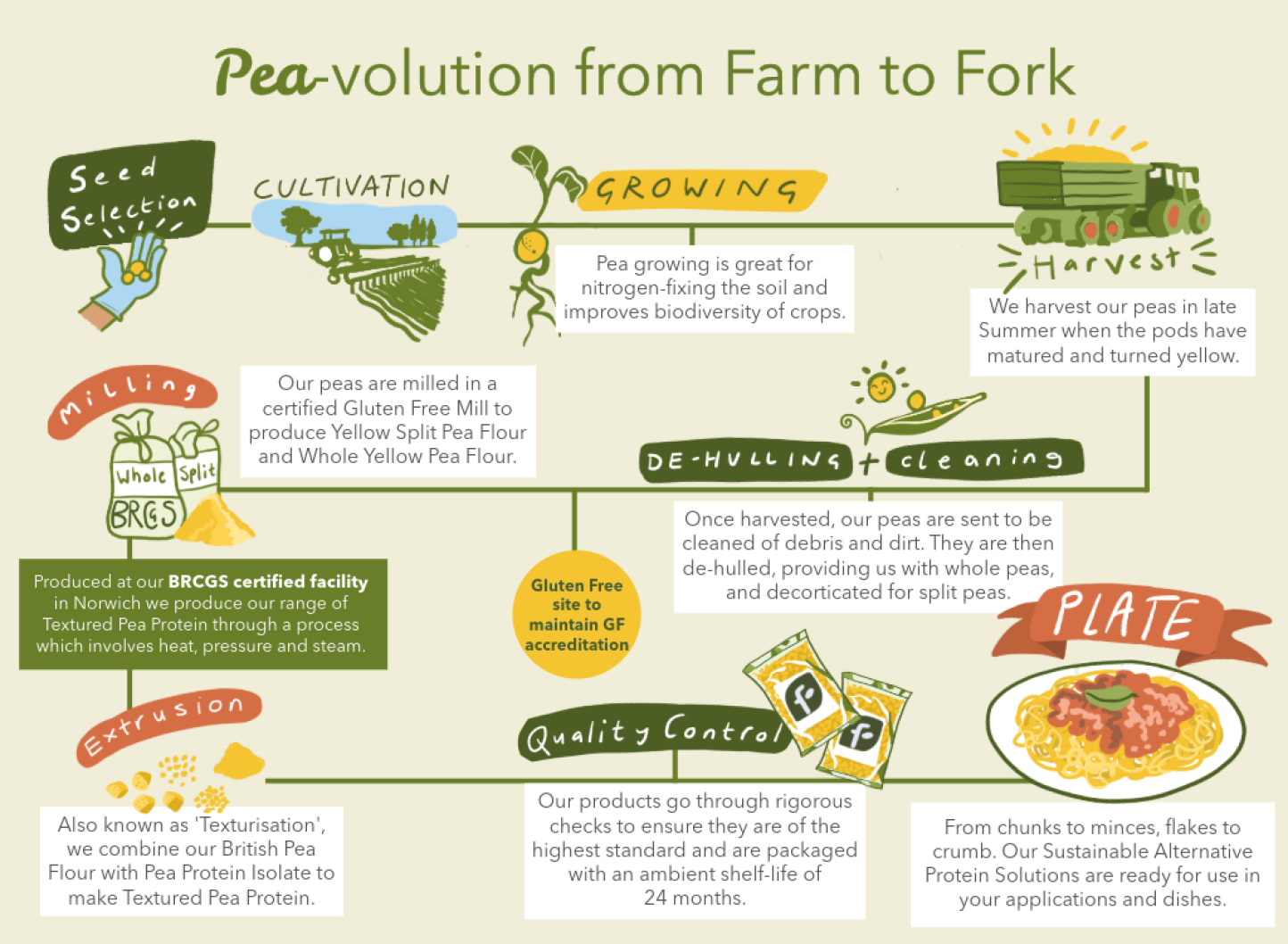
The Sustainability Benefits of Pea Protein Ingredients to the UK Economy
As consumers focus on including more veg-led and hybrid meals in their diet, the UK food industry is increasingly looking for sustainable alternatives to traditional meat products. One 'alternative' that stands out for its environmental and economic benefits is pea protein. Derived from yellow peas, pea protein is not only a nutritious and versatile ingredient but made using a percentage of British peas, it has advantages for the wider UK economy too.
Let’s explore the sustainability benefits of using pea protein ingredients and how they contribute to a greener and more resilient UK economy.
- Supporting Local Agriculture and Reducing Imports
The use of Novo Farina pea protein ingredients promotes the cultivation of yellow peas, which can be grown across the UK. By using a percentage of British-grown crops, we're supporting local farmers and encouraging the growth of pulses like peas on home soil. This is beneficial not only to the UK economy but reduces its reliance on imported peas, soy and other plant proteins, which often come from overseas markets like China and South America.
Sustainable-sourcing of pea protein helps cut transportation costs and the associated carbon emissions from long-distance imports. In addition, investing in domestic agriculture strengthens rural economies and promotes agricultural diversity, which is crucial for the long-term health of the UK’s farming industry.
- Lower Environmental Impact
Pea protein has a significantly lower environmental footprint compared to animal-based proteins and other plant proteins like soy. Growing peas requires less water, less land, and fewer chemical inputs, such as fertilisers and pesticides, compared to livestock farming. Peas are also a nitrogen-fixing crop, meaning they enrich the soil by naturally adding nitrogen, which reduces the need for synthetic fertilisers and improves soil health for future crops.
This reduced reliance on chemical inputs and resources contributes to the overall sustainability of UK agriculture, lowering greenhouse gas emissions and helping the UK and You move closer to net zero.
- Energy Efficient Processing
The process of producing Textured Pea Protein (see above From Farm to Fork Infographic) from yellow peas is far more energy efficient compared to the production of animal-based proteins. Livestock farming is resource-intensive, requiring vast amounts of feed, water, and land, as well as producing significant methane emissions. In contrast, the production of Textured Pea Protein, although still uses a process which requires energy, is simpler and consumes far fewer resources.
By adopting pea protein ingredients, the UK food industry can lower its energy consumption and reduce the environmental impact of food processing, contributing to a more efficient and sustainable supply chain.
- Meeting Consumer Demand for Sustainable Products
Consumer awareness around sustainability and the environmental impact of food production is growing rapidly. More UK consumers are seeking out sustainable, hybrid and plant-based products, making pea protein an attractive ingredient for both Foodservice and Food Manufacturers looking to meet these demands.
Offering products made with pea protein helps food businesses position themselves as environmentally conscious, appealing to a growing number of eco-aware consumers. This shift not only benefits the environment but also boosts the UK economy by supporting a dynamic and evolving food market.
- Reducing Food Waste
Pea protein ingredients, such as Textured Pea Protein or Yellow Pea Flour, have a 24 month shelf-life and are stable in ambient conditions. This reduces the need for refrigeration and decreases the likelihood of food spoilage, thus helping to cut down on food waste. Reducing food waste is critical in improving sustainability across the food supply chain, as it minimizes resource waste and economic losses.
In addition, since pea protein ingredients can be used in a wide range of food products — from meat alternatives to recipe boxes and healthy food-to-go solutions — they provide food manufacturers with flexible solutions that contribute to efficient product development and less wastage.
Conclusion
The sustainability benefits of pea protein ingredients are clear — they reduce reliance on imported proteins like Soy and Pea Protein as a waste product from countries such as China. This lowers environmental impact, supports local agriculture, and contributes to a more energy-efficient UK food production system.
Incorporating pea protein into food products and onto menus is not just a smart choice for sustainability it’s a step towards a greener, healthier, and more resilient UK economy and a step away from supporting imported ingredients. At Novo Farina, we are proud to be a part of this sustainable shift, offering high-quality pea protein ingredients that make a positive impact on both the environment and the UK’s future.
